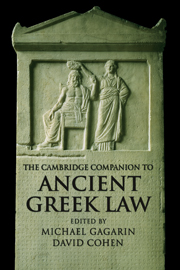Book contents
- Frontmatter
- Introduction
- Part 1: Law in Greece
- Part 2: Law in Athens I: Procedure
- 5 Law and Oratory at Athens
- 6 Relevance in Athenian Courts
- 7 Differentiated Rhetorical Strategies in the Athenian Courts
- 8 The Role of the Witness in Athenian Law
- 9 Theories of Punishment
- 10 The Rhetoric of Law in Fourth-Century Athens
- Part 3: Law in Athens II: Substantive Law
- Part 4: Law outside Athens
- Part 5: Other Approaches to Greek Law
- Index
5 - Law and Oratory at Athens
from Part 2: - Law in Athens I: Procedure
Published online by Cambridge University Press: 28 August 2006
- Frontmatter
- Introduction
- Part 1: Law in Greece
- Part 2: Law in Athens I: Procedure
- 5 Law and Oratory at Athens
- 6 Relevance in Athenian Courts
- 7 Differentiated Rhetorical Strategies in the Athenian Courts
- 8 The Role of the Witness in Athenian Law
- 9 Theories of Punishment
- 10 The Rhetoric of Law in Fourth-Century Athens
- Part 3: Law in Athens II: Substantive Law
- Part 4: Law outside Athens
- Part 5: Other Approaches to Greek Law
- Index
Summary
The late fifth century at Athens marks an important change in the nature of the historical record. It is not so much that earlier forms of evidence disappear - indeed, the rise of what is often called “radical” democracy after ca. 460 B.C. sees an exponential increase in the number of surviving inscriptions, though these are often of less significance as legal sources than might have been anticipated - but that they are joined from ca. 420 by a new type of literary text, which has come to dominate modern study of the Athenian legal system: law-court speeches, which purport to present a record of what was said by one (or occasionally both) of the parties performing at a trial.
My brief in this chapter is to use the medium of the speeches to introduce the study of fourth-century Athenian law, which forms the subject of the next two sections of the volume. But to focus simply on the status of these texts as historical evidence may be too narrow a perspective. Athenian lawcourt speeches reflect a system of procedural law in which the respective rôles played by performers and by hearers within a trial are very different from those found in modern jurisdictions, whether in common-law countries such as England and the United States or in civil-law systems such as those of Continental Europe.
- Type
- Chapter
- Information
- The Cambridge Companion to Ancient Greek Law , pp. 97 - 111Publisher: Cambridge University PressPrint publication year: 2005
- 5
- Cited by

